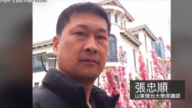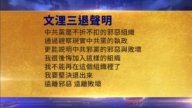【新唐人2012年1月20日訊】18號上午,台灣國史館發表《蔣中正總統五記》新書發佈會。《五記》是摘錄蔣介石日記,以編年體方式分類抄寫,全部原文重現,一字不漏,國史館希望「還原歷史、認識民國」。研究蔣介石生平的學者表示,《五記》的相關記述不僅反映蔣介石個人立場,也提供極具歷史意義的細節。兩岸何去何從? 可以從歷史中找到線索。
《蔣中正總統五記》是從蔣介石日記中抄寫出來,分成五個主題,包括《困勉記》、《遊記》、《學記》、《省克記》、《愛記》等。
國史館長呂芳上表示,《五記》提供的訊息足以作為蔣一生個人行止、和近百年國家走向的重要參考資料。內容雖然重新打字整理,但全部原文重現,一字不漏,希望「還原歷史、認識民國」。
「蔣介石研究群」召集人黃自進指出,《五記》以日記原稿為基礎,參考其他手稿編撰,更能明白當時事件的始末。例如1940年3月,日本一手扶持的「汪偽政府」成立於南京,11月,日本外相松岡洋右向重慶國民政府謀和,《五記》點出居中牽線的是銀行家錢永銘。
「蔣介石研究群」召集人黃自進:「所以這五記是分門別類的,從日記裡面節錄出來的,它好處,首先日記沒有的東西它絕對不會無中生有,所以它的真實性、史料的可靠性很高的。在日記裡面是記述當天他面臨的事情、他的所感,所以他有些事情,人跟事他不是交代很清楚的,可是五記,是後來的…他的秘書幫他重新編撰的時候,會把關鍵的人跟事補進去,所以看日記的時候,你有時候看不清楚,看五記反而可以看得清。」
蔣介石的舊部屬—-原行政院院長郝柏村,及蔣介石生前身邊人士出席了《五記》的發佈會,他們都推崇蔣介石的人格特質、肯定他一生為「民族、國家、民主自由」所做的奮鬥。
黃自進:「我從來沒看過日記能夠那麼樣去真實面對自己,這是我們覺得蔣介石日記裡面他的可貴。蔣介石日記是從1917開始寫起,到1972年,55年的日記,幾乎每一天都沒有停,他偶爾停,他會寫,今天生病沒有寫日記,不過在55年歲月裡面這日記沒寫的其實並不多,這也是他的日記評價那麼高,五記還有出版的價值的原因。」
郝柏村去年出版《解讀蔣公日記:1945-1949》,他希望把八年抗戰期間蔣公日記中,有關軍事部分再解讀出來。他表示,在大陸,完全沒有抗戰歷史真相,他認為,蔣公日記是證明歷史真相的證據。
原中共中央文獻研究室委員、「周恩來生平研究組」組長高文謙向《新唐人》表示,還原歷史本來面目,讓民眾了解歷史真相,中國才能往前進步。
高文謙:「民眾是有知情權的,中共的歷史,實際上就是一個為中共自己解釋自己權力合法性的這麼一個歷史,所以中國今後的任何的進步,必須要還歷史本來面目,還毛澤東—-文化大革命,還鄧小平—-鎮壓六四,像江澤民的話,鎮壓法輪功,胡錦濤的話,重判劉曉波,像這幾件事情的話,遲早要把這些案子都徹底的給翻過來。」
曾經擔任兩蔣秘書的楚崧秋也出席了《五記》新書發佈會,據報導,他是在1954到1958年之間,也就是在台灣命運面臨生死存亡的時候追隨蔣介石,他說「蔣公」是打從內心的服膺國父孫中山,是真心「為國為民」。
新唐人記者常春、周平、孫寧採訪報導。
New book of Chiang Kai-shek’s Diaries Released, Expected to Recover Historical Truth
On January 18th, Taiwan’s Academia Historica released its
new book, “Five Diaries of President Chiang Kai-Shek.”
The book excerpts Chiang’s diaries chronologically, and
preserves the original writing.
Academia Historica hopes to recover the true history
of Chiang and the Republic of China during his presidency.
Scholars of Chiang commented that, the “Five Diaries”
not only reflects Chiang’s personal opinions, but also provides precious historical details.
Clues in the book might be found for dealing with future
cross-strait relations.
Excerpts from the new book, “Five Diaries of President Chiang
Kai-Shek,”
are categorized into five themes including diligence,
touring, study, introspection and compassion.
Director of the Taiwanese Academia Historica, Lu Fang-sang,
said that information from the book provides sufficient
references to obtain an in-depth picture of Chiang’s personal
behavior and Republic of China’s history throughout his life.
Though the contents have been rearranged, every word in
Chiang’s diaries is published exactly in its original form,
“recovering the true history of Republic of China.”
The organizer of Chiang Kai-shek Research Group”, Huang
Tzu-chin, said the “Five Diaries” is based on the original diary scripts, referring to some other scripts as well.
This makes it easier to understand historical events in a more
comprehensive way.
For example, in March, 1940, Wang Jingwei’s regime was
established in Nanjing under the support of the Japanese.
In November of the same year, the Japanese minister of foreign
Affairs, Yosuke Matsuoka,
with government of Republic of China,
sued for peace in Chongqing.
The “Five Diaries” reveales the fact that it is the banker
Qian Yongming who delivered the message.
Huang Tzu-chin: ”The diaries are categorized into five themes,
which are excerpted from Chiang’s diaries.
One advantage of the book is that, it doesn’t fabricate that
which is not written in the diaries, so it is a very reliable historical recording.
On the other hand, some of the diaries only tell us the
happenings on a particular day and his feelings on it,
but the cause and effect is sometimes unclear or missing.
This book has been edited by his secretary, who added the
necessary details back in.
So for some events you can learn more from the “Five Diaries”
than from the original diaries.
Chiang’s subordinate, the former premier of Taiwan,
Hau Pei-tsun, along with some other Chiang’s acquaintances, attended the book’s launch event.
They all praised Chiang’s personality with complimentary
words regarding his struggle for the country and its democracy.
Huang Tzu-chin: ”I’ve never seen a diary which depicts as
true a man like Chiang Kai-shek’s does.
He insisted on writing diaries from 1917 to 1972.
He rarely skipped a day during those 55 years.
He still wrote, “I am ill today so I can’t write” on days he had
to pause, and it didn’t happen many times in his life.
That』s why his diaries are highly regarded and need to be published.”
In 2011, Hau Pei-tsun published the book “An Insider’s
Viewpoint on Mr. Chiang Kai-shek』s diary: 1945-1949.”
He expected it would provide insight into the
military-involved diaries during the Second Sino-Japanese War.
Hau said that little has been revealed in Mainland China about
the war; Chiang’s diary could strongly support the truth.
The ex-committee member of the CCP Central Literature
Research Center, Gao Wenqian, told NTDTV that China
won’t advance until true history is recovered and made known
to the Chinese people.
(Gao Wenqian):”The Chinese people have a right to know.
the CCP always explains or fabricates historical events
in a way that supports the “legality of its authority.
Therefore, factual history has to be recovered before
any real political progress can be made in China.
A list of important historical events include Mao’s true
personality and life, the Culture Revolution, Deng Xiaoping’s
suppression of Tiananmen Square protests, Jiang Zemin’s
persecution of Falun Gong, and Hu Jintao’s execution of Liu Xiaobo.
The lies told by the CCP have to be uncovered sooner or later.”
The secretary of Chiang Kai-shek and Chiang Ching-kuo,
Tsu Sung-chiu, also attended the new book’s launch.
Tsu is reported to have followed Chiang Kai-shek between
1954 and 1958, which was Taiwan’s most trying time.
He said that Mr. Chiang is a true follower of Sun Yat-sen
and has worked for the country and its people with truthfulness.
NTDTV reporters, Chang Chun, Zhou Ping and Sun Ning





























